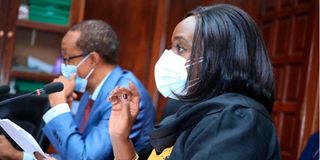How we can make Kenya benefit from South-South Cooperation window

Cabinet Secretary, Ministry of Foreign Affairs, Raychelle Omamo (right), Principal Secretary in the ministry Macharia Kamau.
What you need to know:
- There is no clear, generally agreed definition of what South-South Cooperation includes.
- Many developing country governments have negotiated bilateral cooperation agreements in several areas.
The concept of South-South Cooperation (SSC) is not widely recognised or understood by most citizens of developing countries, although they are meant to be its beneficiaries. Its purpose is to promote trade and the exchange of resources, technology and knowledge between developing countries in Africa, Asia, the Middle East and Latin America — the “South”.
It is based on the premise that developing countries should be able learn much from one another without having to involve the industrialised countries of Western Europe, North America or Japan — the “North”.
Its origins date back to the very beginnings of the “non-aligned movement” at the first Afro-Asian conference in Bandung, Indonesia, in April 1955, where many countries confirmed that they did not want to take sides between North Atlantic countries (many of whom had been colonial powers) led by the United States, or the Soviet bloc.
Egypt, Ghana, India, Indonesia and Yugoslavia were the main countries involved in establishing the non-aligned movement in Belgrade in1961. In 1978, at a high level meeting in Buenos Aires, the UN adopted the term “Technical Cooperation among Developing Countries”. In the early 2000s, “South-South Cooperation” came into common usage.
But despite its long history, SSC has not lived up to expectations of increasing trade and promoting cooperation among developing countries. First, there is no clear, generally agreed definition of what South-South Cooperation includes. Secondly, because of uneven growth and development over the years, the composition of the Global South has changed, and relationships have evolved.
Bilateral cooperation agreements
The third issue relates to what counts as SSC. For instance, should direct trade between Kenyan and Ugandan companies be classified as SSC, or bilateral trade? Finally, two key tenants of the non-aligned movement were solidarity and reciprocity amongst member states. But when a recipient country was unable to meet its share, UN agencies or other donors filled the shortfall, undermining the SSC spirit.
Notwithstanding these continuing challenges, there has been some progress. For example, many developing country governments have negotiated bilateral cooperation agreements in several areas. Growing attention has been given to sub-regional and regional economic cooperation, such as the East African Community and the Association of South-East Asian Nations.
Sharing best practices, such as benchmarking, is another important way of promoting SCC. For example, Qatar hosted a three-day high-level meeting in 2007 to share its experience of oil and gas development with other resource-rich states, including many African countries..
In the past, higher education in East Africa was based on a reciprocal system, shared across three countries. Makerere University College in Uganda offered courses in education, medicine and forestry. Nairobi Royal College in Kenya focused on engineering, architecture and sciences. Dar es Salaam College in Tanzania offered courses in law and social sciences. Students from across the region could apply to any college. Fees and allowances were the same.
But how can SCC evolve in the age of globalisation and disproportionate power and influence of countries such as China and India? There is a critical need to define exactly what is meant by SSC. In Kenya, we would benefit from more informed discussion of SSC in the media. How can it benefit us? How should SSC be taught in schools and colleges? How should SSC be incorporated in our national development plans and strategies?
Dr Kakonge is a former Kenya’s Permanent Representative to the UN Office and WTO in Geneva. [email protected]





